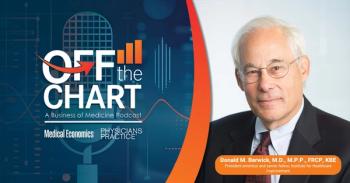
The Overrated Mandate
Unless the Supreme Court overturns the entire health reform law, it won't matter much. Health reform can survive without the individual mandate. Here's why.
Can health reform survive without the individual mandate? We may be about to find out, if the tenor of the questions coming from the Supreme Court's conservative justices last month are any guide. They compared the mandate to a requirement to buy burial insurance; wondered if we would next be required to eat broccoli; and generally carved up the lawyer defending the Affordable Care Act (ACA) like a Christmas goose.
None of which is to say, necessarily, that any part of the law will be overturned. Trying to divine what the court will do by parsing questions during oral arguments is a fool's game. Regardless, unless the Court overturns the entire law - not just the mandate but the Medicaid expansion and the Medicare reforms, too - it won't matter much. Health reform can survive without the individual mandate. Here's why:
The mandate is an overrated element of the ACA's goal of expanding insurance coverage, which is itself overrated. Widening access to insurance is an important public policy goal but it's not the most important part of the ACA, and achieving it doesn't depend on the mandate's survival. The large number of uninsured (about 50 million and counting) is a symptom of healthcare's biggest problem - exploding costs - not the cause. The ACA will succeed or fail based on its ability to rein in healthcare costs generally and Medicare costs in particular. Nothing will make health insurance more accessible than making healthcare more affordable.
Even without the mandate, millions of uninsured Americans will gain access to coveragevia the expansion of Medicaid (as long as the Court doesn't overturn that). On the other hand, even with the mandate, millions of people will still be uninsured: illegal immigrants, who are excluded from the mandate; members of certain religious groups who are exempt from it; and scofflaws who'll ignore it (since paying the fine will be much cheaper than buying insurance).
If the mandate falls, there are still plenty of things Congress can doto encourage insurance purchases by those incorrigible young-and-healthies. Indeed, under the law as written, only about 6 percent of Americans will actually face penalties for refusing to buy insurance, according to the Urban Institute. I understand the actuarial problem inherent in allowing people to wait until they get sick to buy insurance, but in a country of 300 million people it's hard to see how one-fifteenth of the population can bring the whole system to its knees if the rest are covered. And that young-and-healthy cohort is not principally responsible for uncompensated care in American hospitals. In any case, Congress would be left with plenty of tricks within the tax code to push more people into coverage, even if a straight do-it-or-else penalty isn't one of them.
Even if you believe that removing the mandate would unravel the law's guarantees that people will be issued coverage regardless of their health status (and at roughly the same premium as everyone else), and that Congress can't figure anything else out, none of that should affect the Medicaid expansion.
More importantly, it's irrelevant to the Medicare reforms that are designed to move healthcare away from its unsustainable fee-for-service payment methodology. Enough already about the mandate. Healthcare reform will succeed if - and only if - healthcare provider payment reform succeeds. If not, it will fail.
Bob Keaveney is the editorial director of Physicians Practice. He can be reached at
Do you think the Affordable Care Act should be ruled unconstitutional? Tell us about it in the comment section below. Unless you say otherwise, we'll assume that we're free to publish your comments in upcoming issues of Physicians Practice, in print and online.
This article originally appeared in the May 2012 issue of Physicians Practice.
Newsletter
Optimize your practice with the Physicians Practice newsletter, offering management pearls, leadership tips, and business strategies tailored for practice administrators and physicians of any specialty.








